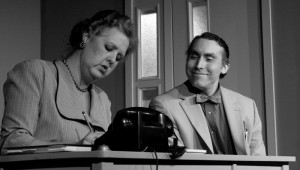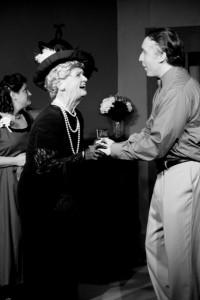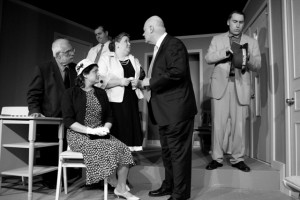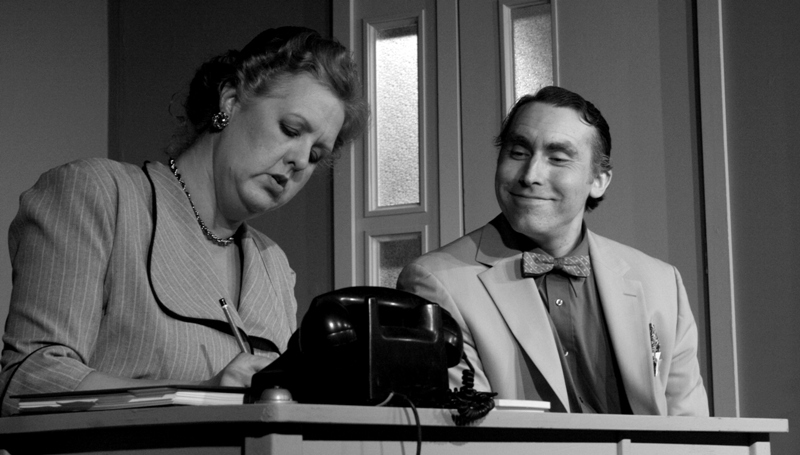
Sherry Snyder (Mrs. Chumley) and Morgan Reinbold (Elwood) in a scene from HARVEY running at Barley Sheaf Players in Lionville, PA.
Mary Chase’s HARVEY continues at the Lionville theatre until June 23rd. Chase was a reporter in Colorado—and mother of three boys—when she penned HARVEY. It took her two years, working at night, to complete her comedy, which she started in the hopes of making a grieving neighbor laugh. HARVEY made its Broadway debut in November of 1944 and ran for 1,775 performances—placing it 35th on the list of all-time longest running Broadway productions (musicals and straight plays). The play won the 1944 Pulitzer Prize for Drama—beating out Tennessee Williams’ THE GLASS MENAGERIE. A fact that shocked me, I must confess.
The plot is relatively simple. At the outset, we meet Veta Louise Simmons and her daughter Myrtle Mae. Veta is widowed and has moved back into the family home, now owned by her brother Elwood P. Dowd. Veta is desperate to be accepted by local society—and find Myrtle a well-to-do husband. Unfortunately, Elwood is hindering that. He is an affable man, well liked by many, but there is one problem: he claims to have an unseen (and presumably imaginary) friend, Harvey—whom Elwood describes as a six-foot, three-and-one-half-inch tall “pooka.” We soon learn that Harvey has taken on the form of a rabbit. Elwood introduces Harvey to everyone he meets. Veta is finding it increasingly more difficult to deal with Elwood’s eccentric behavior; she is mortified and feels it is destroying any chance of Myrtle ever finding a beau. She decides the only recourse is to have Elwood committed to a sanitarium to spare the family future upset and social ruin. A comedy of errors ensues once everyone arrives at the sanitarium, Chumley’s Rest.
Now, in Celtic myth, a pooka is a fairy creature both revered and feared. The pooka may be regarded as being either menacing or beneficent. According to legend, the pooka is a deft shapeshifter, capable of assuming a variety of terrifying or pleasing forms, and may appear as a horse, rabbit, goat, goblin or dog. Fairy mythologist Thomas Keightley said “notions respecting it are very vague,” and in a brief description gives an account collected from a boy living near Killarney that “old people used to say that the Pookas were very numerous…long ago…” In Elwood’s case, the pooka is the result of overindulgence in alcohol.
As Veta and Myrtle Mae, Michele Bolay and Jennifer Kaczmarski give very credible performances as mother and daughter. Bolay has captured the dithery female that was so popular in 40s comedies, and Kaczmarski counters that with her bratty teen. Cindy Schneider suits up nicely as the family’s dowager aunt, Mrs. Ethel Chauvenet, and Paul Gullo brings the right amount of officiousness to the role of Judge Omar Gaffney, the family’s attorney. Christine Lombardo serves as the family maid—and de facto scene changer. A thankless role she handles with aplomb.

Jennifer Kaczmarski (Myrtle Mae), Cindy Schneider (Mrs. Chauvenet), Morgan Reinbold (Elwood) in Barley Sheaf’s HARVEY.
The sanitarium staff features Ron Blasdell as Dr. William R. Chumley, Kelley Stanford as Nurse Ruth Kelly, Wayne Grinwis as Dr. Lyman Sanderson and Scott Ryan as orderly Duane Wilson. All except Wilson seem to come under Harvey and Elwood’s spell. Blasdell does a fine job of the great psychiatrist coming rather unglued and Ryan is amusing as a pint-sized tough. Grinwis and Stanford are appropriately starchy, but seem to struggle with the underlying romance between their two characters. The ensemble is rounded out by a very funny turn from Sherry Snyder as Mrs. Betty Chumley, the doctor’s wife, and C.C. Summerfield as cabbie E.J. Lofgren. His speech about what happens to patients after a stay at Chumley’s Rest is solid work.
The role of Elwood can be a daunting one—after all, Jimmy Stewart’s portrayal in the film version is iconic. “The Big Bang Theory’s” Jim Parsons is attempting to make it his own in the current Broadway revival. But his physical resemblance to Stewart shows the imprint left by one of America’s most beloved actors. Barley Sheaf has followed suit in the casting of Morgan Reinbold as Elwood. He is a lanky man of a similar build to Stewart. Unfortunately, I felt he was also trying to channel Stewart’s performance, as opposed to making the role his own. He’s pleasant enough to watch, but one can’t help but hear the many hints of the delivery in the film.
First-time director Katie Farnum paced her production fairly well. I would have made a couple of cuts here and there, but that’s just me. A wonderful sound design of great 40s songs was provided by Chris Schuman. Well done. Mr. Grinwis served double duty on the production since he also provided the set design. The stage is split in half to show both the Dowd family library and the reception area of Chumley’s Rest; a device which cuts down on scene change time fortunately—and deals with the support pole that lives down center on the Barley Sheaf stage. The stage is small to begin with, so only giving the actors half of the space to work in created some challenges that—for the most part—were met. There were only a couple of instances where things got jammed up. The director and her designer chose to decorate the sets in shades of black, white and gray—I’m assuming to evoke the feel of 1940s black & white films. Costumer Lindsay Franklin continued this theme with the cast’s ensembles. The looks were very authentic 40s attire (including the women’s hair,) but it was a bit strange when Myrtle referred to her tea party dress as a shade of rose. The other deviation—and I’m not sure why this was done—was Elwood’s beige suit and blue shirt. I don’t think they had blue dress shirts in the 40s…

Paul Gullo (Judge Gafney), Jennifer Kaczmarski (Myrtle Mae), Wayne Grinwis (Dr. Sanderson), Michele Bolay (Veta), Ron Blasdell (Dr. Chumley), and Morgan Reinbold (Elwood) in HARVEY.
I have to interject here that, as someone who has lived with people struggling with addiction and mental illness, I was having a hard time seeing the comedy in a play about an alcoholic. At the time Ms. Chase wrote her piece, we were ignorant on these topics; the town drunk was a source of comedy to most. In today’s enlightened age (to a point) is it appropriate to revive a play that makes light of these issues?
But—the house was packed last Friday night and the audience had a wonderful time. So, by all means go catch one of the remaining performances.
HARVEY
By Mary Chase
Directed by Katie Farnum
June 8—23, 2012
Barley Sheaf Players
810 N. Whitford Road
Lionville, Pa 19353
610-363-7075
www.barleysheaf.org
P.S.—a special thanks to the House Manager and his son who helped me with my dead battery!


